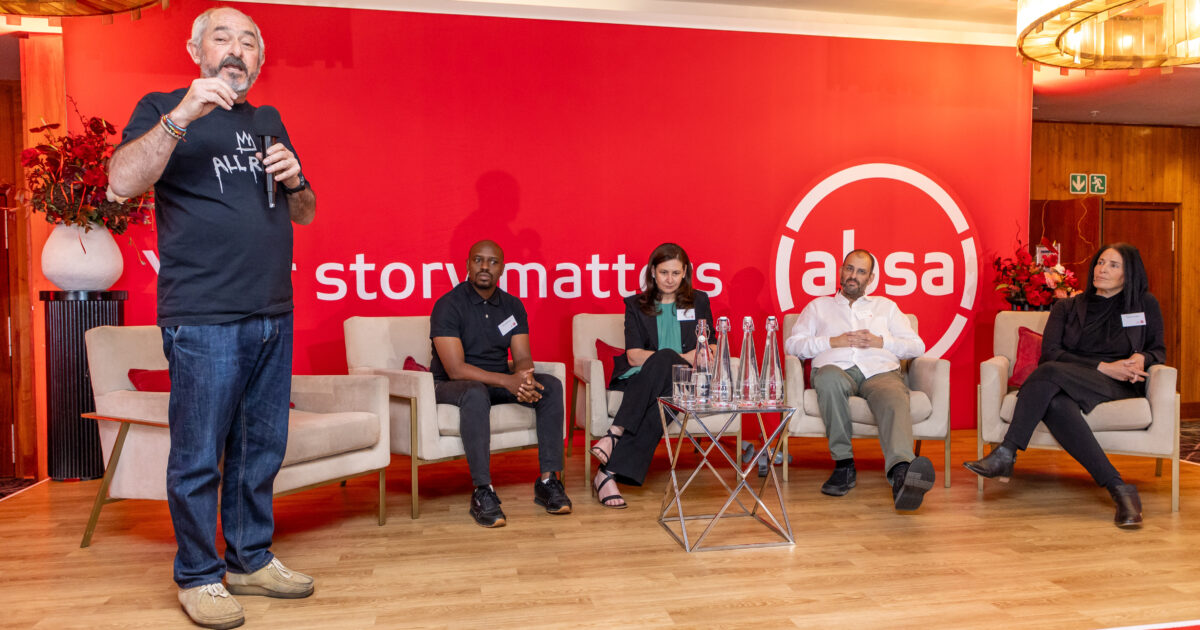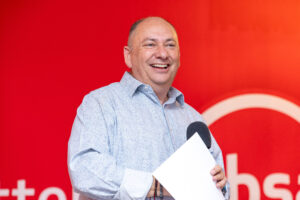Achievers
A winning story we must tell

“The core of Jozi My Jozi is story doing, then telling,” Nando’s founder Robbie Brozin told nominees and guests at the Absa Jewish Achiever Awards Nominees Breakfast on 15 November.
Brozin, who is Jozi My Jozi’s director, was referring to the work this group, which describes itself as a “movement born out of deep passion for Johannesburg”, has done over the past few years to fix infrastructural problems and reimagine possibility, particularly in downtown sections of the city.
And, he was referring to the Jewish Achiever Awards’ title sponsor, Absa’s, brand promise, “Your story matters”, which perfectly describes the success of South African Jews over more than a century and why it’s an important story to tell.
“If Joburg isn’t fixed, the whole of South Africa is broken,” Brozin said.
Jozi My Jozi is about rejuvenation through collaboration and creativity – connecting “projects to solvers” – because, as Brozin points out, you can’t just throw money at fixing Joburg’s problems.
Jozi My Jozi Creative Director Melusi Mhlungu recalls being asked when he left a thriving career in New York to come back to the city, “Don’t you like electricity?”
“But just because we have no power, doesn’t mean we’re powerless,” he said, pointing out, “There’s no greater brand than the one I grew up with.”
Creativity is one thing, but Brozin’s team does the hard yards too, building initiatives like collaboration between Taddy Blecher’s Maharishi Institute, Anglo American, and the University of the Witwatersrand to create a world-class “Education Town” in Anglo’s former buildings in Marshalltown in downtown Johannesburg.
Security is another initiative, with a new security academy training hundreds of people to “transform the city”, and collaboration with CAP and Anglo’s “The Firm” to remove the threat of crime and urban decay from downtown Johannesburg.
So, too, is the revamp of the Nelson Mandela Bridge, the movement’s first project. And it has great plans for the upcoming G20 Summit in Sandton in 2025, for which it says that the “fact that government hasn’t done anything is our greatest opportunity”.
The SA Jewish Report’s 23-year venture with Absa to sponsor the Achiever Awards has resulted in the building and sharing of many incredible stories, Howard Sackstein, the chairperson of the SA Jewish Report and Achiever Awards, told guests at the breakfast.
“With Absa, we have reimagined, recreated, and rebuilt role models,” Sackstein told nominees and guests, referring to the 825 nominations for awards this year, requiring 92 interviews, and five panels of judges.
Nine thousand people from the community voted for candidates at the awards, Sackstein said, 800 were present in person at the awards in Sandton, and about 20 000 watched in their lounges, “waiting to be inspired by you”.
Referring to Absa’s 23 years of sponsorship, Sackstein quipped that “most marriages don’t last that long”, saying “Absa isn’t just a bank, it’s there to inspire a nation.”
He said the story of the Jewish community mattered because from the original emigrants looking for opportunity, many fleeing pogroms in Europe, we have built an inspiring community that seeks to build a better country for all.

Citing famous South African Jews like Albie Sachs; Arthur Chaskalson; Ina Perlman; Glynne Wolman; Sol Kerzner; Natie Kirsh; Eric Ellerine, Dion Friedland; Eric Samson; Robbie Brozin; Phillip Tobias; Valerie Mizrahi; Jody Scheckter; Shaun Tomson; William Kentridge, Pieter-Dirk Uys; and Johnny Clegg, Sackstein said, “They inspire us, and we understand the potential for ourselves.
“[The Jewish community] believed education was more important than land,” he said, “community more important than politics; and values more important than fame. They did not seek the approval of others, and they still don’t today.”
“It shows that the circumstances of our birth shouldn’t determine the promise of our future. It tells the teacher in Bisho, that in the digital era, you can find significance in every part of the world, and your story actually matters.”
“We tell the stories that really matter,” Sackstein said, referring to the founding of the SA Jewish Report 25 years ago, which he said was done with the vision of “elevating and meshing the community, and raising standards”.
“Twenty-five years later, legacy media is falling to pieces, with a reputation for delivering partisan news and propaganda,” he said. However, the SA Jewish Report, which is determined to be credible and tell the story of a free South Africa, has never been in a stronger position, with 33 000 weekly hardcopy readers; 38 000 on its digital database; and roughly 100 000 visitors to its website. “It’s not just read in South Africa, but around the world,” Sackstein said.
“Your job is to reimagine the great possibilities for this remarkable country,” Sackstein urged nominees. “Although it may have drifted over decades, reimagine your city, your country, and the world.”
“Each honouree represents a force for good, giving back to the community by uplifting others,” said John Tshabalala, Absa managing executive Private Banking.
“They show us what’s possible when we lead with determination and heart,” he said, pointing out that we need this kind of resilience like never before.
Marlene Louw, senior agricultural economist at Absa, elaborated on this positive outlook for South Africa’s future, saying that the combination of reduced loadshedding; fiscal consolidation; improved agricultural conditions; and the expected further lowering of the oil price all boded well for the economy.
“Interest rates are on a cutting cycle,” Louw said, with economists predicting a 125 basis point cut, with the prime rate at 10.5% at the end of 2026. “This is good for the consumer,” she said, though she emphasised that United States President-elect Donald Trump’s tariff policies could still have a negative spin-off on South Africa’s interest rates.
Year on year, there has been an 18% drop in the fuel price, she said, putting roughly R3 billion in the pockets of consumers.
The movement to the two-pot system, which enables South Africans to access some of their retirement savings, has also stimulated the economy, with R21 billion in withdrawals in the first six weeks. “Consumers are spending on debt; education; reinvesting; and travel,” Louw said. “It’s resulted in a R10 billion windfall for the fiscus.”
Absa is bullish about South Africa’s growth in 2025 in spite of continued issues such as water restrictions and poor logistics, and Louw pointed out that across industry, particularly in agriculture, there has been great agility in the face of disruption, which is part of the solution.